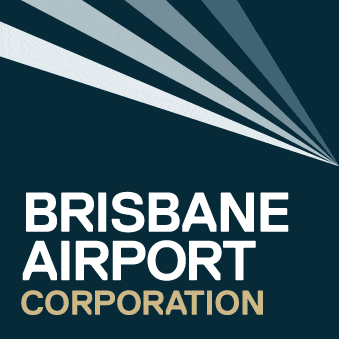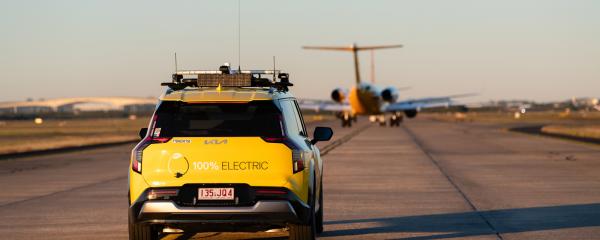Brisbane Airport Corporation (BAC) has a strong focus on sustainability, with a number of initiatives implemented over the years to reduce our impact, encouraging sustainable and responsible growth while supporting our communities.
Our achievements to-date provide the foundation for our commitment, as we continue to aspire to create a sustainable, world-leading airport city that future generations trust and are proud of.
Our Sustainability Timeline
In 2010 Brisbane Airport established more than 285 hectares of protected biodiversity zones, which is more than 10% of the airport’s landmass.
Emissions reduction program commenced
The Green Building Council of Australia (GBCA) has awarded Australia’s first GreenStar – Communities rating to Brisbane Airport Corporation (BAC) for the entire Brisbane Airport site.
The Brisbane Airport site, comprising 2700 hectares of land which will eventually house more than 50 commercial office, mixed use, retail and industrial buildings, has achieved a 4 Star Green Star – Communities rating under the PILOT version of the rating tool.
Green Star – Communities is one of the world’s first independent, transparent, national schemes designed to assess and certify the sustainability of large-scale master planned development projects. Read more.
To achieve Level 3 Optimisation Accreditation, BAC successfully reduced the level of its Scope 1 and 2 greenhouse gas emissions, mapped the carbon footprint for the whole of Brisbane Airport, and demonstrated successful engagement with key stakeholders in ongoing efforts to improve the airport’s environmental sustainability.
Brisbane Airport was the 2nd Australian airport and the 8th airport in the Asia-Pacific region to reach this level. Read more.
Brisbane Airport Corporation (BAC) is proud to be the first airport in Australia to formally commit to celebrating and promoting the traditions, laws and customs of Aboriginal and Torres Strait Islanders, with its first Innovate Reconciliation Action Plan (RAP) officially endorsed by Reconciliation Australia in 2026.
Working in close partnership with the Traditional Owners, BAC’s RAP is based on building relationships, showing respect and looking for opportunities, while helping create social change and economic contributions for Aboriginal and Torres Strait Islander communities.

Brisbane Airport (BNE) was the first Australian airport to roll out a fleet of 11 electric buses. Read more.
In 2018, Brisbane Airport invested $11 million in a major solar project across six sites on the airport. This project added 18,000+ panels to the airport precinct.
Trial of artificial intelligence to reduce energy consumption in buildings with 12% reduction in energy use
Brisbane Airport recognises that being a leader in sustainability means constantly challenging ourselves to create the best future possible. Our revised sustainability targets demonstrate our focus on building a sustainable Airport City. This includes a commitment to be a Net Zero airport by 2025 (Scope 1 and 2), which is a significant advancement from our original 2050 target. Read about our sustainability strategy and other targets.
Australia’s first all-electric refueller deployed by Air BP was launched at Brisbane Airport. The vehicle was developed in Australia, and is the first all-electric hazardous goods vehicle and refueller approved for use in this country. Read more.
The Oscar smart recycling assistant is in operation at the Domestic Terminal and Skygate, helping our passengers and customers to boost recycling through gamification. Brisbane Airport was the first airport in Australia to implement these smart, touch-free artificial intelligence waste stations, with the aim of increasing the amount of waste diverted from landfill.

Start of transition to electric commercial mower fleet

Brisbane Airport remains committed to renewable energy across all areas of the airport and with a precinct that is operational, 24 hours a day, 365 days a year, the power required to light, heat, and cool each of the facilities is significant.
As part of our ongoing sustainability strategy, we are embarked on a project to expand our solar energy assets at the International Terminal. This includes an additional 5,000 panels, producing 3.2 Gw/h per year, covering 7% of the airport's total energy requirements.

Brisbane Airport Corporation (BAC) has entered into an historic six-year agreement to secure power that is linked to renewable energy from Queensland’s Clarke Creek Wind Farm & Blue Grass Solar projects as part of its commitment to be net zero for Scope 1 and 2 emissions by 2025.
BAC is the first customer to sign onto Stanwell Corporation’s renewable energy pipeline, which will supply up to 185 GWh of power each year. Read more.
Brisbane Airport became the first Australian airport to receive Level 4 Airport Carbon Accreditation by Airports Council International (ACI). The “transformation” status recognises Brisbane Airport’s long-term carbon management strategy towards absolute emissions reductions and evidence of forging meaningful partnerships to reduce the emissions of airport partners. Read more.

Stralis Aircraft has successfully completed a hydrogen-electric powered propellor spin on a ground-demonstrator aircraft, fondly known as “Clyde”, at Brisbane Airport.
It’s another step toward emission-free flight, with much of the work undertaken at Stralis’ base at Aviation Australia on Brisbane Airport. T
he test was performed using fuel cells and gaseous hydrogen, with the only emission from the system being water vapour.
This is a key milestone on the path to getting “Bonnie”, the sister experimental flight-demonstrator Bonanza A36 aircraft, into Queensland skies in 2025. Read more.

Brisbane Airport is the first Australian airport to install a common-use ground support equipment charging system in an airside environment.
This initiative, one of many Future BNE transformation projects, will see 35 chargers initially installed, with plans to expand to 100+ chargers in the future, reflecting the airport's commitment to sustainability and operational efficiency. Read more.

Brisbane Airport has been awarded the Partner of the Year category at the 2024 Change Maker Awards, the first time this category has been introduced by Containers for Change. This achievement acknowledges the airport and the community’s dedication to the program since joining in January 2022.
So far, Brisbane Airport has collected over one million containers and donated over $100,000 to local charities and community groups through the refunds. If placed side-by-side, the containers would stretch 120 kilometres—or roughly the distance from Brisbane to Toowoomba. Read more.

In 2010 Brisbane Airport established more than 285 hectares of protected biodiversity zones, which is more than 10% of the airport’s landmass.
Emissions reduction program commenced
The Green Building Council of Australia (GBCA) has awarded Australia’s first GreenStar – Communities rating to Brisbane Airport Corporation (BAC) for the entire Brisbane Airport site.
The Brisbane Airport site, comprising 2700 hectares of land which will eventually house more than 50 commercial office, mixed use, retail and industrial buildings, has achieved a 4 Star Green Star – Communities rating under the PILOT version of the rating tool.
Green Star – Communities is one of the world’s first independent, transparent, national schemes designed to assess and certify the sustainability of large-scale master planned development projects. Read more.

To achieve Level 3 Optimisation Accreditation, BAC successfully reduced the level of its Scope 1 and 2 greenhouse gas emissions, mapped the carbon footprint for the whole of Brisbane Airport, and demonstrated successful engagement with key stakeholders in ongoing efforts to improve the airport’s environmental sustainability.
Brisbane Airport was the 2nd Australian airport and the 8th airport in the Asia-Pacific region to reach this level. Read more.
Brisbane Airport Corporation (BAC) is proud to be the first airport in Australia to formally commit to celebrating and promoting the traditions, laws and customs of Aboriginal and Torres Strait Islanders, with its first Innovate Reconciliation Action Plan (RAP) officially endorsed by Reconciliation Australia in 2026.
Working in close partnership with the Traditional Owners, BAC’s RAP is based on building relationships, showing respect and looking for opportunities, while helping create social change and economic contributions for Aboriginal and Torres Strait Islander communities.
Brisbane Airport (BNE) was the first Australian airport to roll out a fleet of 11 electric buses. Read more.
In 2018, Brisbane Airport invested $11 million in a major solar project across six sites on the airport. This project added 18,000+ panels to the airport precinct.
Trial of artificial intelligence to reduce energy consumption in buildings with 12% reduction in energy use



Brisbane Airport recognises that being a leader in sustainability means constantly challenging ourselves to create the best future possible. Our revised sustainability targets demonstrate our focus on building a sustainable Airport City. This includes a commitment to be a Net Zero airport by 2025 (Scope 1 and 2), which is a significant advancement from our original 2050 target. Read about our sustainability strategy and other targets.
Australia’s first all-electric refueller deployed by Air BP was launched at Brisbane Airport. The vehicle was developed in Australia, and is the first all-electric hazardous goods vehicle and refueller approved for use in this country. Read more.
The Oscar smart recycling assistant is in operation at the Domestic Terminal and Skygate, helping our passengers and customers to boost recycling through gamification. Brisbane Airport was the first airport in Australia to implement these smart, touch-free artificial intelligence waste stations, with the aim of increasing the amount of waste diverted from landfill.
Start of transition to electric commercial mower fleet
Brisbane Airport remains committed to renewable energy across all areas of the airport and with a precinct that is operational, 24 hours a day, 365 days a year, the power required to light, heat, and cool each of the facilities is significant.
As part of our ongoing sustainability strategy, we are embarked on a project to expand our solar energy assets at the International Terminal. This includes an additional 5,000 panels, producing 3.2 Gw/h per year, covering 7% of the airport's total energy requirements.
Brisbane Airport Corporation (BAC) has entered into an historic six-year agreement to secure power that is linked to renewable energy from Queensland’s Clarke Creek Wind Farm & Blue Grass Solar projects as part of its commitment to be net zero for Scope 1 and 2 emissions by 2025.
BAC is the first customer to sign onto Stanwell Corporation’s renewable energy pipeline, which will supply up to 185 GWh of power each year. Read more.

Brisbane Airport became the first Australian airport to receive Level 4 Airport Carbon Accreditation by Airports Council International (ACI). The “transformation” status recognises Brisbane Airport’s long-term carbon management strategy towards absolute emissions reductions and evidence of forging meaningful partnerships to reduce the emissions of airport partners. Read more.



Stralis Aircraft has successfully completed a hydrogen-electric powered propellor spin on a ground-demonstrator aircraft, fondly known as “Clyde”, at Brisbane Airport.
It’s another step toward emission-free flight, with much of the work undertaken at Stralis’ base at Aviation Australia on Brisbane Airport. T
he test was performed using fuel cells and gaseous hydrogen, with the only emission from the system being water vapour.
This is a key milestone on the path to getting “Bonnie”, the sister experimental flight-demonstrator Bonanza A36 aircraft, into Queensland skies in 2025. Read more.
Brisbane Airport is the first Australian airport to install a common-use ground support equipment charging system in an airside environment.
This initiative, one of many Future BNE transformation projects, will see 35 chargers initially installed, with plans to expand to 100+ chargers in the future, reflecting the airport's commitment to sustainability and operational efficiency. Read more.
Brisbane Airport has been awarded the Partner of the Year category at the 2024 Change Maker Awards, the first time this category has been introduced by Containers for Change. This achievement acknowledges the airport and the community’s dedication to the program since joining in January 2022.
So far, Brisbane Airport has collected over one million containers and donated over $100,000 to local charities and community groups through the refunds. If placed side-by-side, the containers would stretch 120 kilometres—or roughly the distance from Brisbane to Toowoomba. Read more.






